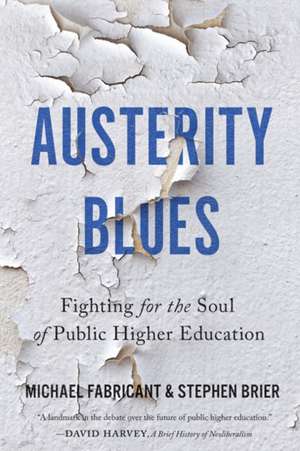Austerity Blues – Fighting for the Soul of Public Higher Education
Autor Michael Fabricant, Stephen Brieren Limba Engleză Hardback – 27 oct 2016
Fabricant and Brier describe the extraordinary growth of public higher education after 1945, thanks largely to state investment, the alternative intellectual and political traditions that defined the 1960s, and the social and economic forces that produced austerity policies and inequality beginning in the late 1970s and 1980s. A provocative indictment of the negative impact neoliberal policies have visited on the public university, especially the growth of class, racial, and gender inequalities, Austerity Blues also analyzes the many changes currently sweeping public higher education, including the growing use of educational technology, online learning, and privatization, while exploring how these developments hurt students and teachers. In its final section, the book offers examples of oppositional and emancipatory struggles and practices that can help reimagine public higher education in the future.
The ways in which factors as diverse as online learning, privatization, and disinvestment cohere into a single powerful force driving deepening inequality is the central theme of the book. Incorporating the differing perspectives of students, faculty members, and administrators, the book reveals how public education has been redefined as a private benefit, often outsourced to for-profit vendors who "sell" education back to indebted undergraduates. Over the past twenty years, tuition and related student debt have climbed precipitously and degree completion rates have dropped. Not only has this new austerity threatened public universities' ability to educate students, Fabricant and Brier argue, but it also threatens to undermine the very meaning and purpose of public higher education in offering poor and working-class students access to a quality education in a democracy. Synthesizing historical sources, social science research, and contemporary reportage, Austerity Blues will be of interest to readers concerned about rising inequality and the decline of public higher education.
Preț: 169.40 lei
Preț vechi: 220.55 lei
-23% Nou
Puncte Express: 254
Preț estimativ în valută:
32.41€ • 33.93$ • 26.82£
32.41€ • 33.93$ • 26.82£
Carte indisponibilă temporar
Doresc să fiu notificat când acest titlu va fi disponibil:
Se trimite...
Preluare comenzi: 021 569.72.76
Specificații
ISBN-13: 9781421420677
ISBN-10: 1421420678
Pagini: 320
Dimensiuni: 159 x 235 x 25 mm
Greutate: 0.54 kg
Editura: Johns Hopkins University Press
ISBN-10: 1421420678
Pagini: 320
Dimensiuni: 159 x 235 x 25 mm
Greutate: 0.54 kg
Editura: Johns Hopkins University Press
Notă biografică
Michael Fabricant is a professor of social work at the City University of New York Graduate Center and the vice president of CUNY's Professional Staff Congress. He is the author of Organizing for Educational Justice: The Campaign for Public School Reform in the South Bronx and the coauthor of The Changing Politics of Education: Privatization and the Dispossessed Lives Left Behind. Stephen Brier is a professor of urban education and the coordinator of the Interactive Technology and Pedagogy program at the CUNY Graduate Center. He is the cofounder of CUNY's American Social History Project and the coauthor and coproducer of the ASHP's Who Built America? multimedia curriculum.
Descriere
Synthesizing historical sources, social science research, and contemporary reportage, Austerity Blues will be of interest to readers concerned about rising inequality and the decline of public higher education.
